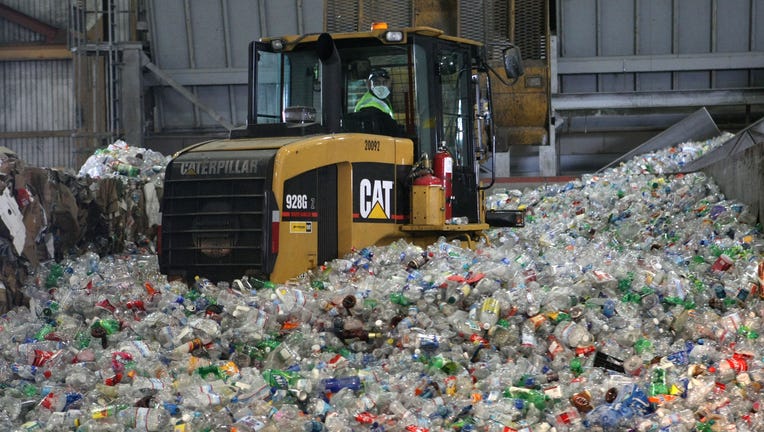Unintended consequences of California's litter problem

SAN FRANCISCO - APRIL 22: A tractor drives through a giant pile of plastic bottles at the San Francisco Recycling Center April 22, 2008 in San Francisco, California. To Coincide with Earth Day, San Francisco recycling companies, Sunset Scavenger Co.
An upcoming California Ballot measure initiative will seek to fight back against the decades of plastic and polystyrene foam waste California has been producing.
On Monday, it was announced Initiative No. 19-0028 will appear on the November 2022 ballot in California.
While the measure begins to address this chronic problem of street litter, ocean pollution and health hazards, it is merely a small step in the long battle Americans will need to wage in order to reverse the damage of our consumer habits.
Some of the regulations included in this initiative include:
- Placing requirements on producers to ensure single-use plastic packaging and foodware is reusable, refillable, recyclable or compostable by 2030
- Placing requirements on producers to reduce or prohibit single-use plastic packaging and foodware
- Establishing Mechanisms for convenient consumer access to recycling, including but not limited to take-back programs and deposits.
During the past 18 months of the pandemic, the state of California has seen a major increase in the amount of trash appearing in highways, parks and cities. An increase in fast food and plastic contained beverages is certainly a factor, as are the influx in improperly disposed medical masks.
In the East Bay, residents near the Bethany Reservoir described conditions as "third world" due to the amount of litter blown in from a nearby landfill. Another East Bay resident from Oakland told us earlier in the year, "Oakland looks like a trash can."
In 2020, CalTrans collected 270,000 cubic yards of trash off California roads. That’s the equivalent of filling up 18,000 garbage trucks.
The city of Ventura, California has already enacted their own ban on polystyrene foam products. The Mayor of Ventura, Sofia Rubalcava, released a statement regarding the ban, "As a coastal community, we must ensure that we are protecting our environment, natural resources, wildlife and the health of our community."
Under pressure from citizens and an upcoming recall election, Governor Newsom announced a major plan to combat this epidemic of litter in the Golden State. The cost of the effort is a reported $1.1 billion dollars.
The litter on California streets is obvious to most citizens as they walk around their cities and drive along their commutes. What isn’t as obvious is the impact our poor recycling habits are having under the surface.
The world’s oceans, a major food source, are paying the price. The oceans now have an estimated 15–51 trillion pieces of plastic litter in them. Not one square mile of surface ocean anywhere on earth is free of plastic pollution.
One of the biggest obstacles in the past year is the influx of billions of masks. The very masks that we’ve been told will keep us safe are rapidly destroying marine life, our water and our food systems. An estimated 1.6 billion masks have already made their way onto the ocean floor just this past year, with many more to follow.
Besides blight, sanitation hazards and clear impacts on our oceans, there is another factor from all of this plastic refuse in our society. It likely leads to lower fertility rates.
A study released in the National Center for Biotechnology Information (NCBI) states, "Microplastics have been detected in human stool, cancer specimens and placenta, highlighting the possible risk for disease load, successful pregnancy and in utero transmission to the offspring."
The study concludes, "Spermatogenesis is highly sensitive to environmental pollutants and sperm quality is affected by microplastics exposure, at least in animal models. In this respect, the possible reproductive health risks of microplastics should not be ignored."
California continues to lead the United States towards a healthier environment and greener economy. However, the overall health of the planet is suffering due to the rapid increase in polystyrene foam waste, single-use plastics and carbon emissions. More work must be done to reverse the effects of the past few decades and avoid the impacts on humanity that may be fast-approaching.

